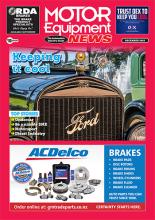Fuji Heavy Industries Ltd. (FHI), the maker of Subaru automobiles, celebrated its 60th anniversary last week.
The origins of FHI go back to the 1917 with the founding of the "Aircraft Research Laboratory" which was later incorporated as "Nakajima Aircraft Co. Ltd". After World War II, Nakajima Aircraft was re-organized as "Fuji Sangyo Co. Ltd". Fuji Sangyo was divided into 12 separate companies in 1950 and on July 15 of 1953, five of those companies merged to form "Fuji Heavy Industries Ltd.".
In 1958, FHI flew the first Japan-made "T-1" jet trainer test plane and released the "Subaru 360" mini car.
Throughout its history, FHI has continued to deliver innovative technologies and unique, epoch-making products such as the "Subaru 1000", Japan's first mass-produced front-engine, front-wheel drive car in 1965.
In 1972 the Subaru "Leone" became Japan's first mass-produced all-wheel drive passenger car and in 1989 the Subaru "Legacy" led the station wagon boom in Japan while in 2011 the unique "EyeSight" driving assist system entered the market.
Subaru first entered the New Zealand market in the early 1960s, when the 360 was imported, followed by the 1000 sedan, which later grew to a 1300cc car. In the 1970s successive versions of the early Leone models were introduced.
In 1977 the local assembly of the Leone wagon and its Ute derivative – sometimes called the Brumby - started at Motor Holdings Otahuhu plant.
Shortly thereafter assembly was transferred to Waitara, just north of New Plymouth, where production continued until the last of the 1987 models were produced late that year.
Subaru was the first of the manufacturers to close its local assembly operations at the end of 1987 and since then all the new Subarus sold here have come from Japan, except the Tribeca, which is manufactured at Subaru of America’s plant in Illinois.
FHI’s technological competence has been passed down in its non-automotive businesses as well. The aerospace business is recognized for its expertise in unmanned aircraft systems and participation in international joint development of commercial airplanes, principally with Boeing.
The industrial product business has been offering highly-reliable general-purpose Robin engines and other engine-driven products to support industries and everyday lives of people worldwide.
FHI also manufactures train rolling stock, buses, light planes and helicopters.
Through its history of innovation, FHI has been earning trust and support from customers for its commitment to engineering excellence as the source of functionality, safety and reliability of its products.
Pursuant to its guiding principle "Confidence in Motion", FHI will continue to serve as a responsible global corporate citizen and commit itself to fulfilling expectations and further enhancing the confidence of customers around the world.


